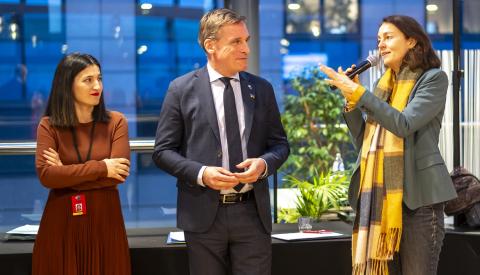European Economic
and Social Committee
"If it didn't exist, it would have to be created" - EESC Liaison Group celebrates its 20th anniversary
On the occasion of the 20th anniversary of the EESC's Liaison Group, the founders and current members of the Group called for intensive action to defend European democracy, open public space and a just Europe.
On 11 December, the European Economic and Social Committee (EESC) hosted the 20th anniversary of its Liaison Group, the only permanent form of structured cooperation between civil society organisations (CSOs) and the EU institutions. “As we celebrate 20 years of the EESC Liaison Group, we honour not only its remarkable achievements but also the enduring partnerships that have shaped participatory democracy in Europe. Over two decades, the Liaison Group has grown into a vibrant platform, amplifying civil society voices and fostering collaboration between diverse stakeholders. As we look to the future, let us continue to stand together to strengthen democratic values, expand civic space, and create a Europe that truly serves all its people,” said EESC President Oliver Röpke in his opening address.
The President also added that, initially, some CSOs feared a loss of independence and that the EESC would monopolise the role of intermediary between them and the EU institutions. However, twenty years later, it is clear these fears have not been confirmed.
“Our journey has not been easy, ” explained Brikena Xhomaqi, Co-chair of the Liaison Group, “But we have learned to trust each other. And I hope we will strengthen our cooperation to fight together for a coherent EU for civil society”,
In her keynote speech, Katarina Barley, Vice-President of the European Parliament, responsible for relations with civil society organisations declared that: “As the European Parliament, we are ready to strengthen our cooperation with the Liaison Group. We need increasingly structured cooperation with civil society organisations. Together, we must do more to counter the threats to democracy in the European Union, which are greater than at any time in the EU's history,” adding that, when it came to the Liasion Group, “If it didn't exist, it would have to be created. ”
The 20th anniversary of the Liaison Group was attended by several key figures of the civil society sector, including representatives of Ukrainian organisations, in line with the EESC's policy of inviting representatives of EU candidate countries to participate in its work. Also in attendance were two former Presidents of the EESC, Staffan Nilsson, Henri Malosse, Luca Jahier and George Dassis.
Luca Jahier highlighted the fact that the EESC has the responsibility to setup and maintain a platform for civil dialogue, while George Dassis explained that: "the main thing is to have peace, and to achieve peace we must be strong and stand together."
In the Liaison Group's meeting just before the celebration event, five more European civil society organisations have been accepted as new members of the EESC Liaison Group, which will now encompass 45 member organisations active at European level.
These newbies are: The European Partnership for Democracy, a European network with a global remit to support democracy; the YES Forum, a European network of organisations working with and for young people with fewer opportunities; Erasmus Student Network, a non-profit international student organisation; ILGA, the International Lesbian, Gay, Bisexual, Trans and Intersex Association and CEPLIS, The European Council of the liberal professions.
About the Liaison Group
The Liaison Group was set up in 2004 to provide a framework for political dialogue and cooperation between the EESC and European organisations and networks. What began with 12 pioneering organisations has since grown, as the Liaison Group's anniversary celebrations underlined, into a vibrant platform for dialogue, cooperation and policy-making that now comprises 45 CSO member organisations.
The Liaison Group provides a unique institutional structure for civil society umbrella organisations, enabling civil dialogue and cooperation and promoting participatory democracy. It is a channel through which civil society can discuss and influence the EU agenda and decision-making processes. It contributes to EESC opinions, hearings, conferences and workshops on topics of common interest and to the EESC's contribution to the European Commission's work programme. It organised the annual Civil Society Days from 2012 which in 2024 was brought to the next level by being integrated into the Civil Society Week. Its aim is to help the EU respond to the challenges facing Europeans today - shrinking civic spaces, polarised societies and threats to democratic values - which call for a reinvigorated partnership.
